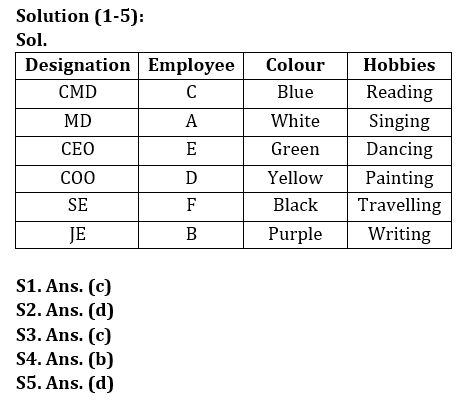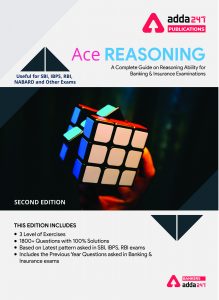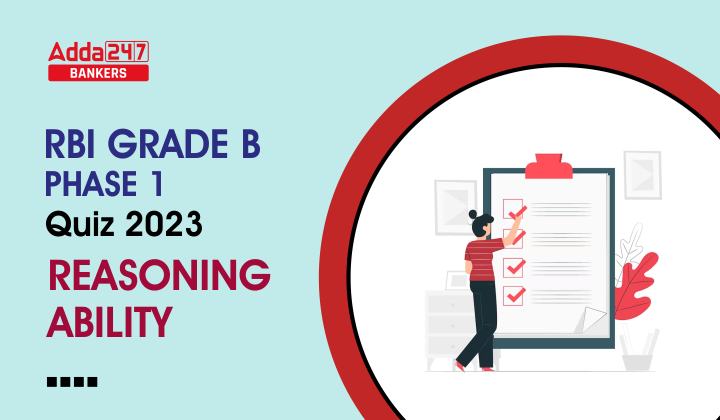Directions (1-5): Study the following information carefully to answer the given questions:
There are six employees A, B, C, D, E, F of a company and all of them work on six different designations in a company viz. CMD, MD, CEO, COO, SE, JE. All the designations given are to be considered in a given order (as CMD is considered as Senior-most and JE is considered as the Junior-most). Each of them likes some colour and have some hobby.
The one who is MD likes white colour. E likes dancing and senior than F who likes black colour. The one who is SE likes travelling. Only two employees are junior than D. The one who likes blue colour is senior than the one who likes Singing. C likes reading and senior than the one who likes green colour. B likes purple colour and junior than F. The one who likes painting is senior than the one who likes writing. The one who likes green colour is senior than the one who likes travelling. C does not like white colour. D does not like green colour. A senior than the one who likes black colour and he is not CEO. The one who likes yellow colour is junior than the one who likes singing. The one who is SE does not like blue colour.
Q1. Who among the following person likes Reading?
(a) A
(b) The one who likes Green colour
(c) The one who is CMD
(d) The one who likes Black Colour
(e) E
Q2. Who among the following SE of the company?
(a) The one who likes writing
(b) A
(c) The one who likes Purple colour
(d) The one who likes travelling
(e) E
Q3. How many persons are senior than F?
(a) Two
(b) One
(c) four
(d) Three
(e)More than Four
Q4. What is the hobby of the COO of the company?
(a) Writing
(b) Painting
(c) Dancing
(d)Singing
(e)Travelling
Q5. What is the designation of the one who likes dancing?
(a) SE
(b) MD
(c) JE
(d) CEO
(e) COO
Directions (6-10): A word and number arrangement machine when given an input line of words and numbers rearranges them following a particular rule in each step. The following is an illustration of input and rearrangement.
Input: first 31 practice linear 22 47 sound 11 62 magic 35
Step I: 11 first 31 practice linear 22 47 sound 62 35 magic
Step II: 11 31 first practice linear 22 47 62 35 sound magic
Step III: 11 31 47 first linear 22 62 35 practice sound magic
Step IV: 11 31 47 22 first 62 35 linear practice sound magic
Step V: 11 31 47 22 35 62 first linear practice sound magic
And step V is the last step of the above input. As per the rules followed in the above step, find out the appropriate step for the given output.
Input: wait 17 48 bad back 23 relation 61 25 puzzle 16
Q6. Which element is exactly between the third element from left end and fifth element from right end in step IV?
(a) 48
(b) back
(c) wait
(d) bad
(e) 16
Q7. In step II, ‘17’ is related to ‘back’ and ‘wait’ is related to ‘61’. In the same way ‘relation’ is related to?
(a) 25
(b) bad
(c) 23
(d) puzzle
(e) 48
Q8. In which of the following step the elements “48 25 relation” found in the same order?
(a) Step I
(b) Step IV
(c) Step III
(d) Step II
(e) no such step
Q9. In step II, what is the sum of fourth element from left end and third element from right end?
(a) 79
(b) 88
(c) 37
(d) 80
(e) 64
Q10. Which of the following element would be at the third from the left of the element which is sixth from the right end in step III?
(a) 61
(b) wait
(c) back
(d) 16
(e) 48
Directions (11-15): In the following questions, the symbols @, #, %, $ and * are used with the following meaning as illustrated below-
P @ Q – P is neither greater than nor equal to Q
P % Q – P is neither smaller than nor equal to Q
P # Q – P is not greater than Q
P $ Q – P is not smaller than Q
P * Q- P is neither smaller than nor greater than Q
Now in each of the following questions assuming the given statement to be true, find which of the two conclusions I and II given below them is/are definitely true and give your answer accordingly.
Q11. Statements: – Z @ Y, Y % X, X * W, W $ V
Conclusions: – (I) Y % V (II) Z % V
(a) Only conclusion I follows
(b) Only conclusion II follows
(c) Either conclusion I or II follows
(d) Neither conclusion I nor II follow
(e) Both conclusion I and II follows
Q12. Statements: – Z % Y, Y * X, X # W, W * V
Conclusions: – (I) Z % X (II) V $ Y
(a) Only conclusion I follows
(b) Only conclusion II follows
(c) Either conclusion I or II follows
(d) Neither conclusion I nor II follow
(e) Both conclusion I and II follows
Q13. Statements: – Z * Y, Y $ X, X # W, W @ V
Conclusions: – (I) V * Z (II) X % Z
(a) Only conclusion I follows
(b) Only conclusion II follows
(c) Either conclusion I or II follows
(d) Neither conclusion I nor II follow
(e) Both conclusion I and II follows
Q14. Statements: – Z $ Y, Y $ X, X * W, W @ V
Conclusions: – (I) Z $ V (II) V % X
(a) Only conclusion I follows
(b) Only conclusion II follows
(c) Either conclusion I or II follows
(d) Neither conclusion I nor II follow
(e) Both conclusion I and II follows
Q15. Statements: – Z % V, V @ X, X % Y, Y * W
Conclusions: – (I) X % W (II) Y @ Z
(a) Only conclusion I follows
(b) Only conclusion II follows
(c) Either conclusion I or II follows
(d) Neither conclusion I nor II follow
(e) Both conclusion I and II follows
Solutions

Solutions (6-10):
Sol. In this input output question two numbers are arranged in each step following a certain pattern. Let us understand the logic behind it-
For Words: Words are arranged according to the place value of the last letter in the alphabetical series from right to left in the right end. The word which has the last letter, which comes 1st in alphabetical series, is arranged first and so on. For example, “music and guide” in which we can see that “c” and “e” are last letters of both words but c comes 1st, so “music” will be arranged 1st.
For Numbers: They are arranged in increasing order. The prime numbers are arranged first followed by composite numbers from left to right in left end.
Input: wait 17 48 bad back 23 relation 61 25 puzzle 16
Step I: 17 wait 48 back 23 relation 61 25 puzzle 16 bad
Step II: 17 23 wait 48 back relation 61 25 16 puzzle bad
Step III: 17 23 61 wait 48 relation 25 16 back puzzle bad
Step IV: 17 23 61 16 wait 48 25 relation back puzzle bad
Step V: 17 23 61 16 25 48 wait relation back puzzle bad
S6. Ans. (c)
S7. Ans. (d)
S8. Ans. (b)
S9. Ans. (e)
S10. Ans. (a)
Solution (11-15):
S11. Ans. (a)
S12. Ans. (e)
S13. Ans. (d)
S14. Ans. (b)
S15. Ans. (a)





 GA Capsule for SBI Clerk Mains 2025, Dow...
GA Capsule for SBI Clerk Mains 2025, Dow...
 The Hindu Review October 2022: Download ...
The Hindu Review October 2022: Download ...
 IBPS Clerk Mains Cut Off 2025, Check Sta...
IBPS Clerk Mains Cut Off 2025, Check Sta...







